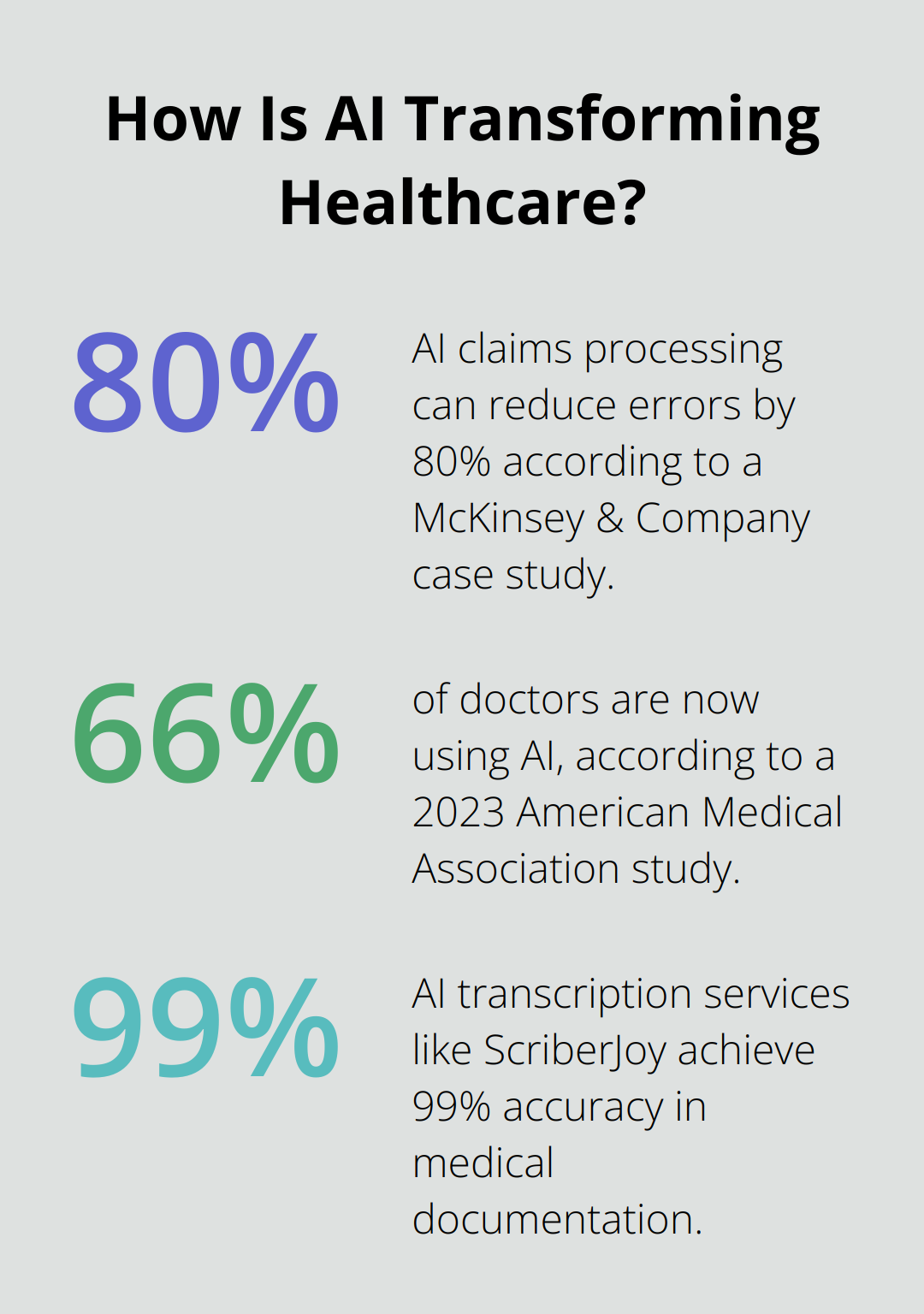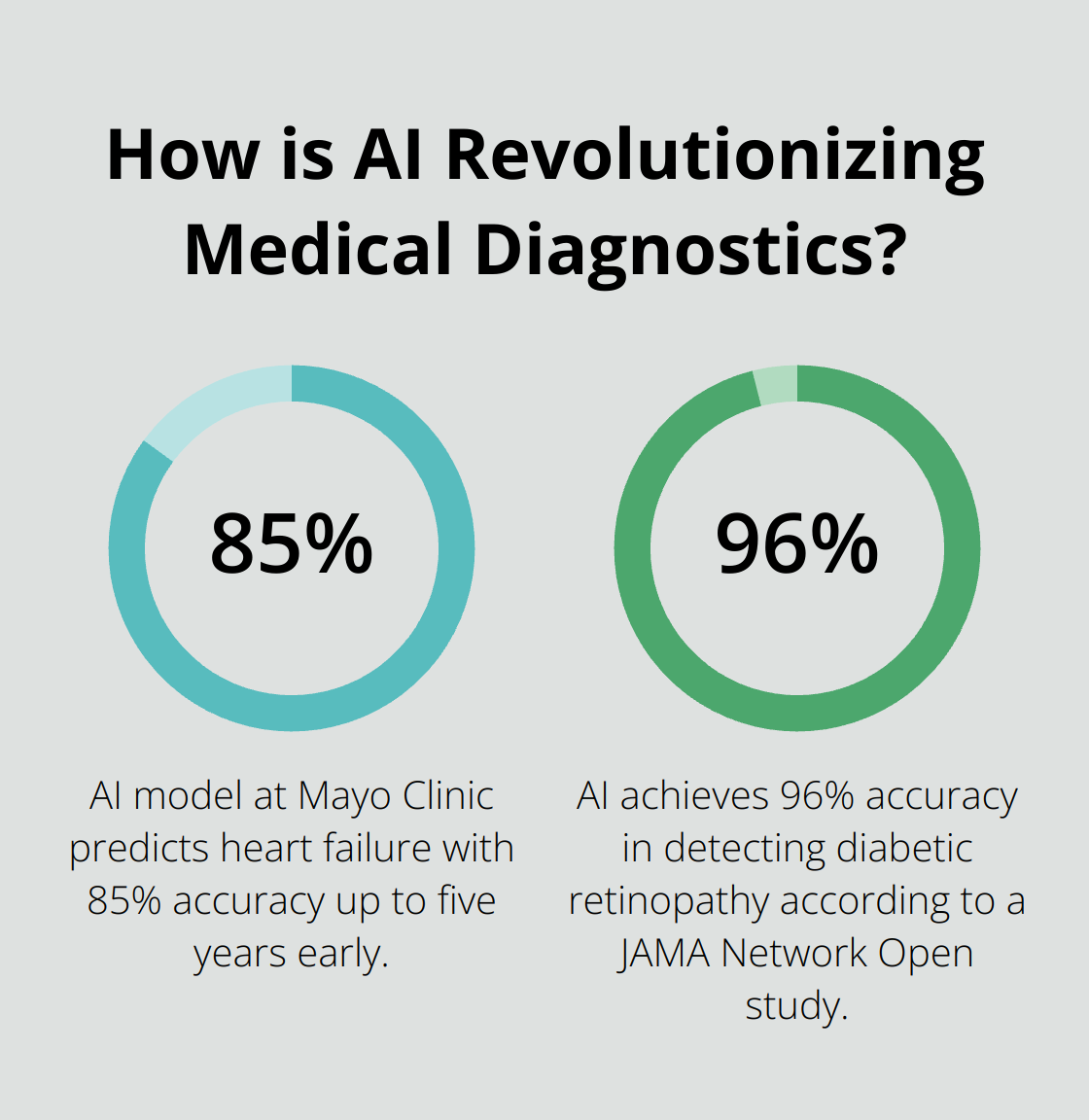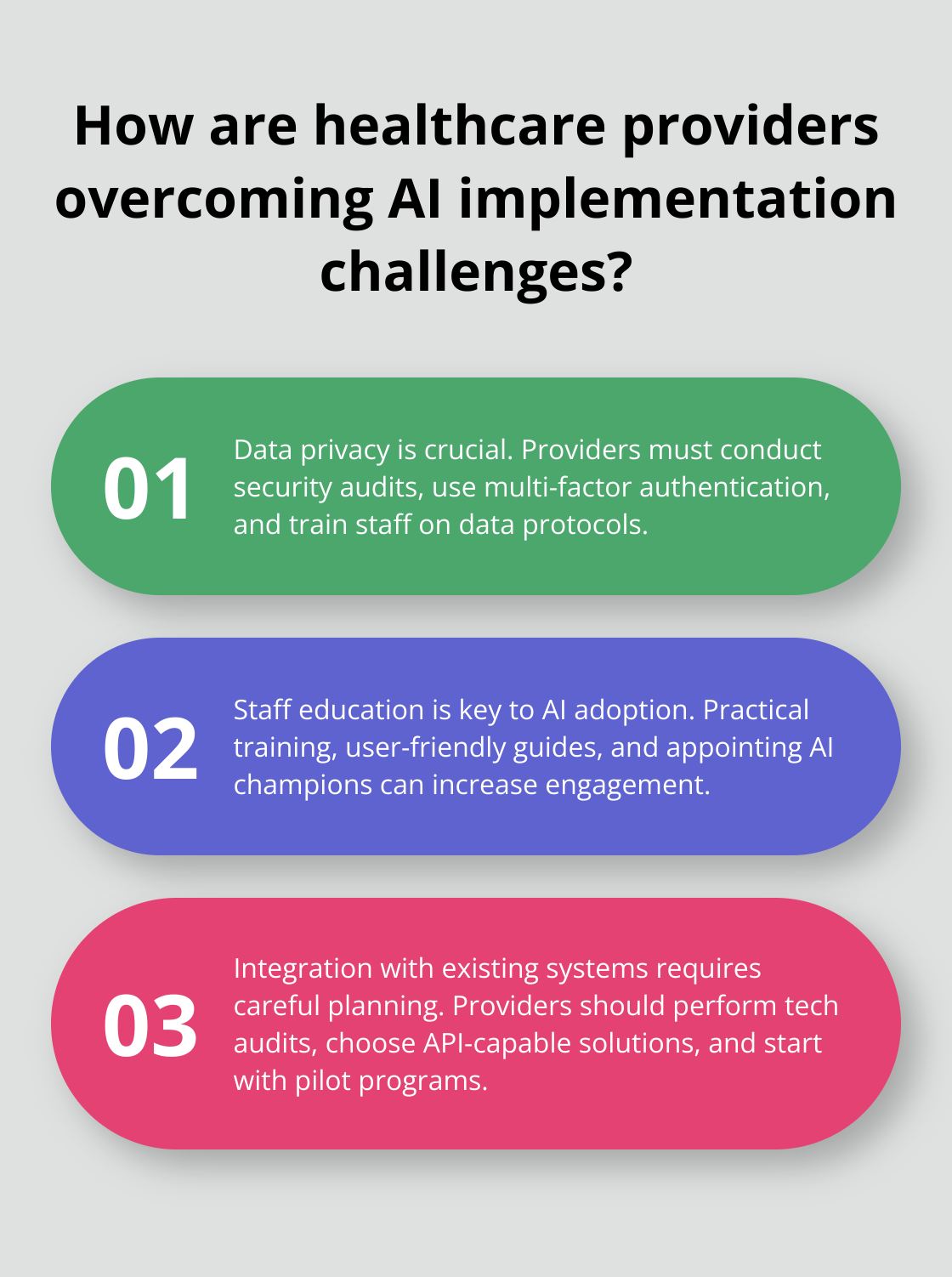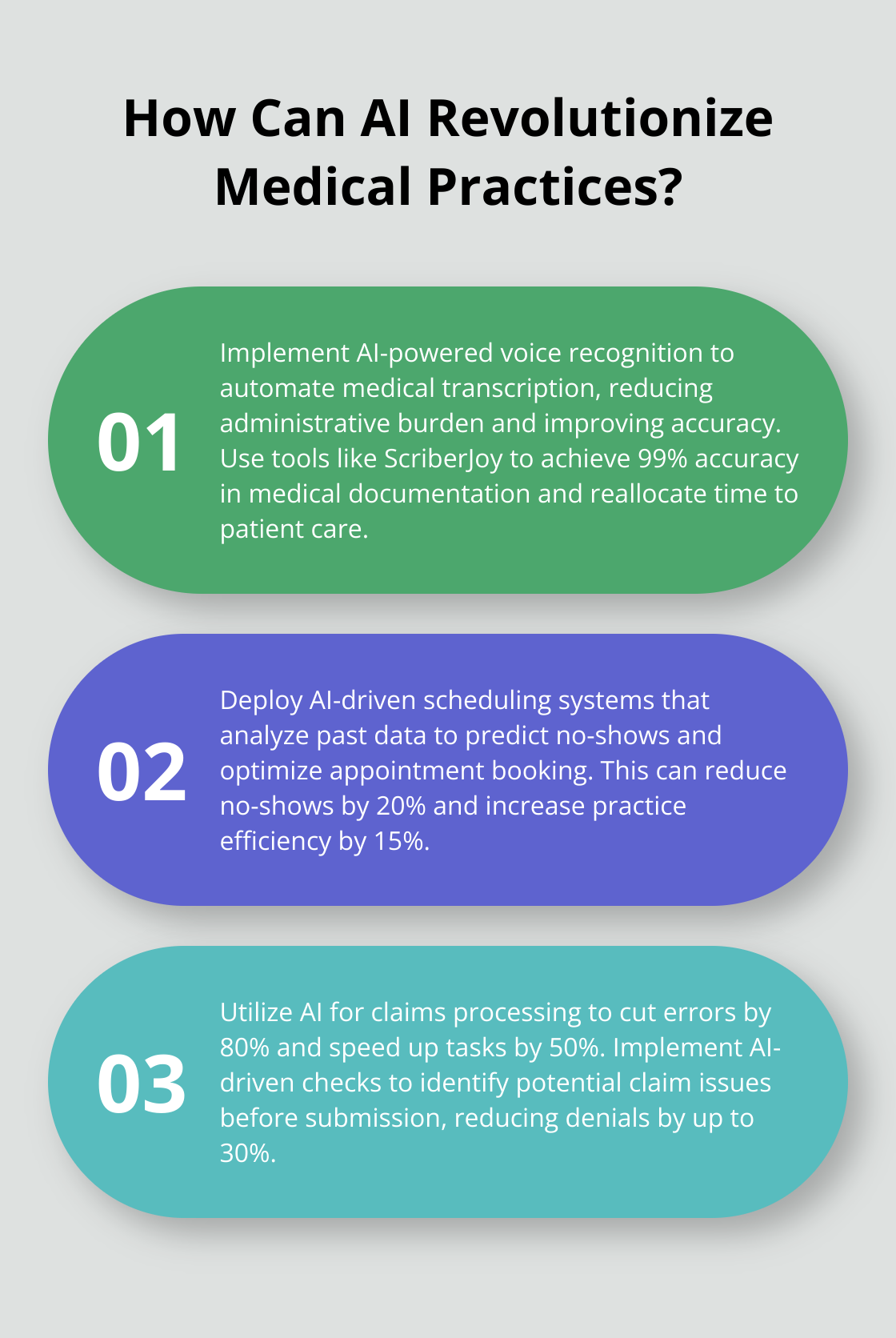AI in healthcare practice management… it’s a game-changer. We’re talking everything from cutting down admin workload (that soul-crushing paper pile) to actually making patient care better. The upside? Huge — like a skyscraper, huge.
At ScriberJoy, we’ve witnessed the magic trick — AI swoops in, and boom, healthcare practices start humming. Efficiency goes up, patient outcomes shine. This isn’t just a blog post; it’s a sneak peek into where AI is shaking things up big time, and, yep, there’s a discussion about those pesky implementation hurdles.
How AI Transforms Healthcare Practice Management
AI is shaking up healthcare practice management-bringing real, concrete goodies to the table. So, a 2023 American Medical Association study dropped some knowledge: 66% of doctors are now riding the AI wave, a nice leap from 38% in 2022. Why the surge? It’s those juicy, tangible benefits AI keeps serving up.
Slashing Administrative Burdens
You’ve got AI-powered tools diving into that Everest of paperwork, drowning healthcare folks in tasks that absolutely no one signed up for. This AI magic? It’s got major chops in cutting down the admin and mental weights that drive burnout, all thanks to automated documentation. More time with patients, less exhaustion for the crew-sounds pretty genius, right?

And then there’s AI-driven voice recognition-sitting in on patient chitchats and zipping the info straight into electronic health records. We’re talking serious gains versus old-school transcription: better accuracy, quicker delivery, and easier on the wallet.
Smarter Scheduling and Patient Communication
AI’s shaking up appointment calendars and nailing patient gab. Those savvy scheduling systems? They’re crunching past data to guess who’s a no-show and keeping practices booked just right. Apparently, this has slashed no-shows by 20% and boosted practice mojo by 15% (a little birdie from Healthcare IT News told us).
24/7 chatbots and virtual assistants are on deck for those basic patient questions, so staffers can handle the tricky stuff. These AI sidekicks book slots, ping reminders, and even sort out symptoms. Some 2023 HIMSS survey noted practices with AI on comms duty saw phone calls nosedive 40% and patient smiles widened by 25%.
Streamlining Billing and Claims
In the money realm of healthcare, AI’s making big waves. Machine learning is speeding through claims with eye-popping speed and precision. McKinsey & Company’s case study spilled the beans: AI claims processing can cut errors by 80% and hustle through tasks 50% faster.
Plus, AI’s got a knack for ironing out revenue cycles. It spots what might slam the brakes on claims before they even hit go, speeding up payments and knocking down denials. One big healthcare system said a fond farewell to 30% of claim denials after cozying up to AI-driven checks.
The Role of AI in Medical Documentation
AI transcription services (looking at you, ScriberJoy) pair up smart tech and human eyes, hitting those golden 99% accuracy marks in medical docs. Think of all the hours trimmed from desk duty, reallocated to, oh, actual patient care.
You can’t argue with the impact AI’s having on healthcare practice management. From peeling off admin stress to jazzing up chat lines with patients and even untangling finances, AI’s proving itself quite the team player for smoother, smarter healthcare.
As we peek further into AI’s practice management magic, there’s a ton to consider on how these tools can flip the script on patient care. Stay tuned as we dive into those AI-fueled insights shaking up treatment plans and personal care in the next act.
How AI Enhances Patient Care and Outcomes
AI isn’t just a sci-fi buzzword floating around healthcare; it’s reshaping patient care. From cutting through the clutter of operations to forecasting health crises before they even think about knocking… AI is becoming healthcare’s MVP.
Predicting Health Risks with AI
AI-powered predictive analytics – that’s where the revolution kicks off. It’s like giving healthcare providers a crystal ball, but high-tech. Take acute kidney injury (AKI) risk scores; AI’s turning them into early warnings that scream “heads up!” before trouble hits, potentially waving goodbye to extended hospital stays.

Then, there’s the Mayo Clinic (no big deal, right?) and their AI model – predicting heart failure with 85% accuracy, up to five years early. That’s not just a guess… it’s like having tomorrow’s newspaper today. Preventive measures? They’re on the front page, saving lives before they need saving.
Personalizing Treatment Plans
Welcome to the era where AI’s turning cookie-cutter medical plans into bespoke healthcare suits. It sifts through oceans of data (genes, lifestyle, the whole shebang) to tailor treatments. Fancy, huh?
Look at IBM Watson for Oncology – name-drops are warranted when you’re talking breakthroughs. Watson’s not here to steal the spotlight from doctors, but to play the perfect sidekick, especially when the going gets tough with those intricate cases.
Catching Diseases Early
Early bird gets the worm – or in this case, early detection makes the difference. AI jumps in, like a relentless detective. Google Health’s AI system? It’s cutting through breast cancer false negatives by 9.4% and false positives by 5.7%… take that, human error.
Over in ophthalmology, AI’s seeing what others miss. Diabetic retinopathy detection? A JAMA Network Open study boasts 96% accuracy. AI’s here, upping the game for early intervention and showing conventional methods the door.
Augmenting Healthcare Providers’ Capabilities
AI’s not out to snatch doctors’ jobs. No, it’s more like their secret weapon. With AI-fueled insights, healthcare couldn’t be more on point… proactive, personalized, and way more effective. As AI shakes things up, brace yourself for tomorrow’s breakthroughs today.
Sure, there are bumps on this road to AI integration, challenges stacked like hurdles on a track. Next up, we’ll dive into these snags and map out strategies to keep the AI machine running smoothly in healthcare’s high stakes arena. Check out this smooth integration guide.
Navigating AI Implementation Hurdles in Healthcare
AI in healthcare-it’s the shiny new toy everyone wants. But let’s not kid ourselves … integrating AI into healthcare practice management is no walk in the park. This chapter digs into the big hurdles and tosses out some lifelines to help you overcome them.
Data Privacy and Security
HIPAA compliance-the armor of patient trust. And before you jump on the AI bandwagon, healthcare providers better get their data protection skills on point. Policies? Yeah, they’re your best friend when dealing with HIPAA risks that can turn your AI dreams into a compliance nightmare.

Here’s your to-do list:
- Keep those security audits coming
- Roll out multi-factor authentication
- Stash data in HIPAA-compliant cloud storage
- Train the troops on data protocols
In the AI game, your security is only as solid as the weakest link in the data chain. Nail it.
Staff Education and Training
New tech in healthcare? Cue the eye rolls and side glances. According to a 2022 study, it’s all about how people perceive and need AI. We’ve got to get those adoption rates up. How? Glad you asked.
- Practical training that won’t bore a turkey
- Guides and FAQs that a fifth-grader can follow
- Appoint those AI champions (the tech-whisperers)
- Keep the support flowing with refresher courses
Cough up the dough for staff education-it’ll pay off big time in AI engagement.
Integration with Existing Systems
Healthcare tech is like a jigsaw puzzle. The pieces are there, but boy, do they need some help fitting together. Here’s how to smooth it out:
- Dive into a tech audit before you start tinkering
- Snag AI solutions with killer API capabilities
- Start small-dip a toe in with pilot programs
- Team up with IT teams and vendors for custom fits
Jump these hurdles and turn them into vaulting poles to boost efficiency and patient care with AI implementation.
Ethical Considerations
AI in healthcare sounds great-until you hit the ethics speed bump. Algorithmic bias, patient independence, human decision-making … the works. When AI comes to play, these concerns need front-row seats.
Here’s the playbook:
- Set those ethical guidelines in stone
- Keep bias in check with regular system assessments
- Be straight-up with patients about AI in their care
- In critical moments, trust the human judgment
By squaring up with these ethical conundrums (all while letting AI work its magic), we’ll keep patient trust on the up and up and nail responsible AI adoption in healthcare.
Final Thoughts
AI integration in healthcare – yeah, it’s a game changer. We’re talking benefits that go way beyond just making the paperwork less soul-crushing. It’s about smoother operations, upping your patient care game, and flipping the script on outcomes with predictive analytics and tailor-made treatment plans. The road ahead for AI in healthcare? More sophisticated tools, stepping up to global health problems, and giving medical research a serious boost.

Now, for healthcare providers… leaning into AI tech means doing a bit of homework. Find those sweet spots where AI can make the biggest splash, invest in getting your team up to speed, and make data security a top priority (seriously, respect the data). Partner up with AI vendors who get healthcare – like, deeply get it. Keep your eyes on the prize: staying patient-centered. Use AI as a wingman, not a replacement, for that human touch.
ScriberJoy is riding this AI wave, contributing to the transformation with our AI-powered medical transcription service. We’re blending top-notch tech with human checks to serve up ultra-accurate medical docs. It’s about freeing up healthcare heroes to do what they do best – focusing on patient care by taking the grind out of the documentation process.

Leave a Reply
You must be logged in to post a comment.